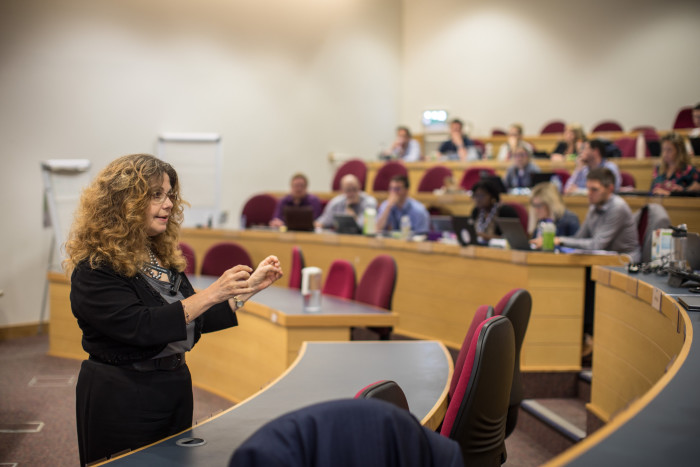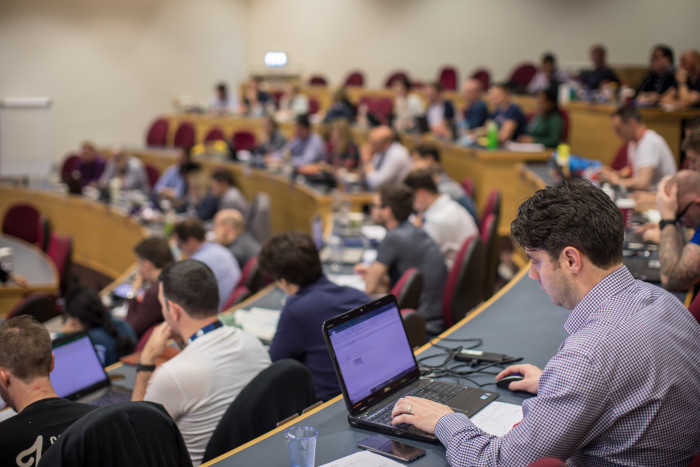Can business schools prove — and improve — their social impact?

Roula Khalaf, Editor of the FT, selects her favourite stories in this weekly newsletter.
As pressure intensifies for business schools to be active citizens and demonstrate the societal impact of their work, one key managerial tool has been missing: rigorous data to help analyse, benchmark and improve their courses and research. Fresh initiatives now suggest some signs of progress.
Alongside teaching more traditional skills and an emphasis on profit maximisation, there is rising pressure from students, employers and faculty to equip those in business, government and non-profit organisations to help tackle climate change, inequality and other, broader challenges for people and the planet.
Much focus has been placed on helping future managers and entrepreneurs meet these challenges through the curriculums of MBAs, masters degrees in management and other specialist diplomas. But the issues and needs are at least as important for more seasoned executives taking executive MBA courses, who are already well established in positions of influence in their organisations.
Advocates such as the scholars in the Responsible Research for Business and Management (RRBM) network and the United Nations Principles for Responsible Management Education (PRME) have long called for greater efforts, backed by a range of individual academics and organisations.
FT Executive MBA Ranking 2022

Find out which schools are in our ranking of EMBA degrees. Also learn how the table was compiled and read the rest of our coverage at ft.com/emba.
PRME has, for several years, solicited regular reports from its business-school members. Yet the results are anecdotal and difficult to measure or compare. RRBM and the International Federation of Scholarly Associations of Management — as well as the Financial Times, through its Responsible Business Education Awards — have organised competitions to showcase strong individual examples.
Now, the pressures for a greater systematic focus on societal impact are going mainstream. The AACSB, the leading US-based accreditation agency, last month published the first outcomes of its efforts to track business schools’ efforts, with institutions mapping their activities against the UN’s 17 Sustainable Development Goals (SDGs) for 2030.
Separately, detailed data released this year in the UK provides insights into an alternative approach. The latest Research Excellence Framework (REF), in which all the country’s universities are required to participate every few years, includes a number of measures of impact.
The AACSB’s assessment of its own first move on social reporting is stark. “Schools are quite immature in their societal impact plans. Most . . . are just figuring out the areas in which they want to concentrate their efforts,” it noted. “[They] need to progress beyond a list of service activities.” It shows most initiatives are associated with the SDGs on quality education; decent work and economic growth; and gender equality.
The limitations include the scope of the AACSB’s tracking, with just 74 institutions reporting to date, predominantly in the US and the UK. More important, only a small number go beyond describing activities and towards collecting measurable outcomes. Still fewer have so far been willing to share details of their initiatives publicly, and those that do provide only limited information.
Digital conference: Spotlight on the Executive MBA

Join global education editor Andrew Jack and business school experts around the world for a free online event on Wednesday October 19, focusing on career impact, insights into the 2022 ranking, and themes from managing disruption to ESG. Register here
The UK’s REF is more transparent and comprehensive. It requires each university department in the country to select case studies and research papers to demonstrate what they are doing to generate impact. External experts then assess and grade the submissions. Faculties of business and management alone cited 16,000 works.
The REF system creates an overall “grade point average” driven by the peer-reviewed judgments of the impact cases based on originality, significance and rigour. An analysis by the Chartered Association of Business Schools shows that the best overall scores align closely with leading institutions judged by broader measures.
The top score goes to Cambridge, followed by Imperial, London Business School, the London School of Economics and City University.
The REF website provides full details for those seeking inspiration, with cases and supporting academic papers citing examples ranging from social-venture incubators and employee-wellbeing interventions to economic modelling and improved demographic indicators for regulators.
An analysis by Wilfred Mijnhardt at the Rotterdam School of Management, using machine learning to scan the contents of the reports, explores the data more deeply by mapping the content of these cases to the SDGs, and scrutinising different schools’ contributions relative to their size, which shakes up the rankings.
As with a range of recent efforts by academics and publishers alike to track the content and value of academic publications, there remains a large gap between the words used in such impact reports and any causal impact beyond academia.
An effort like the REF also requires substantial resources from reporting schools and those providing peer review. Prof Rick Delbridge at Cardiff Business School, who was involved in the assessment, says: “I fear a lot of the impact is on weighing the pig, not fattening the pig. An enormous amount of energy has been expended on reporting what we’ve done, rather than just on doing the right things in the first place. I wonder if we aren’t reaching a period of diminishing returns.”
Data collection comes with costs. But that makes the case for asking the right, focused questions — to add depth to the breadth of insights that transform into actions.
Comments